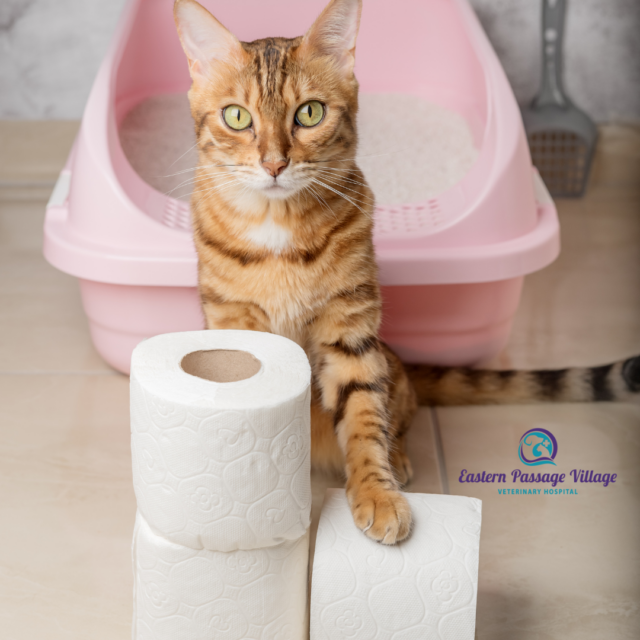
One of the strongest and most offensive smells in the home is that of cat urine, particularly when it is outside of the litter box. Inappropriate urination is a common cause of cat-owner strife, culminating in putting feline pets outdoors, rehoming or even euthanasia! But what causes your cat to urinate outside of the litter box, and how can it be prevented?
Feline Lower Urinary Tract Disease (FLUTD) is a process affecting the lower urinary tract (bladder and urethra (the tube that takes urine from the bladder to outside of the body)). This causes small and frequent urinations, bloody urine, discomfort and straining with urination. Further clinical signs that we may observe with this include cats licking at their urinary opening, as well as urinating in inappropriate places.
Underlying causes of inappropriate urination in cats can generally be divided into medical or behavioural; or a combination of both. Medical causes include, but are not limited to, bladder infections, bladder stones, increased drinking (such as caused by chronic kidney disease and diabetes), arthritis, bladder tumours, constipation and/or a condition called Feline Idiopathic Cystitis (FIC).
FIC is described as a physical manifestation of anxiety that leads to inappropriate urination. Think of how people can get GI upset with stress, cats can get bladder inflammation/upset with stress. In younger cats, FIC is a very common cause of inappropriate urination; however with age, bladder infections and bladder cancer are of higher incidence and concern.
Medical causes of inappropriate urination are commonly diagnosed by urinalysis, x-rays, and in some cases, bloodwork. However, both FIC and behavioural causes are normally pinpointed through a thorough history and through eliminating medical concerns by the same work up as above. Behavioural diagnoses are made through a process of elimination and exclusion, so ruling out medical causes ultimately can lead to a cause and a plan.
Certain history elements may aid in understanding triggers to inappropriate urination. As mentioned above, stress can lead to FIC, so changes in the home such as a new pet, construction, and a new baby (to name a few), are all considered stressors and possible triggers. Other factors can include a litter box that is not cleaned daily, multiple cats using one litter box, inter-cat aggression, and intact (particularly male) cats.
Certain urinating behaviours can also guide understanding behavioural concerns and triggers. For example, if a male cat sprays while standing up on an upright surface or if a cat is repeatedly urinating in the same location outside of the litter box, underlying behavioural factors may be a concern. Medical causes each have their owner respective treatments, ranging from medical to surgical as indicated.
FIC, which generally lasts 1-2 weeks, unfortunately does not have a cure but instead is treated through supportive care. Behavioural causes are treated through addressing the behavioural trigger and, if inappropriate urination persists despite this, considering behavioural medications.
Prevention is not always possible, however it has been shown that flares occur most commonly in overweight cats and those with lower water intake and activity/enrichment levels. Targeting and correcting these concerns may be key in decreasing incidence of these episodes in the future. In certain cases, such as with urinary bladder stones and crystals, a diet change is recommended to balance the pH or acidity of the urine. For these patients, long-term dietary therapy is commonly recommended.
If left undiagnosed and untreated, medical causes of inappropriate urination can culminate in urinary obstruction. This is a severe medical emergency and is a topic for another blog post (stay tuned).
References used:
- Inappropriate elimination: https://veterinarypartner.vin.com/default.aspx?pid=19239&id=4951508
- FLUTD: https://veterinarypartner.vin.com/default.aspx?pid=19239&id=4951487
- Idiopathic cystitis / Pandora syndrome: https://veterinarypartner.vin.com/default.aspx?pid=19239&id=4951488
